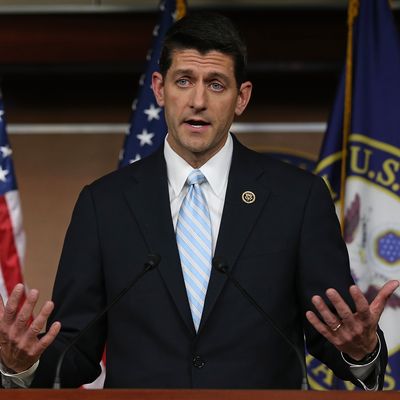
The House Republican “Freedom Caucus” is a quasi-secretive band of procedural radicals who refuse to concede limits to their party’s Constitutional powers. The Caucus hounded John Boehner out of his job as speaker, and did the same to Boehner’s chosen successor, Kevin McCarthy. On Tuesday, Paul Ryan proposed to take Boehner’s job and work out a modus vivendi with the Freedom Caucus. In order to accept the job, Ryan is essentially asking the Freedom Caucus to give up its ability to threaten to depose him — the leverage they used to force Boehner to go along with a succession of crazy schemes. Ryan’s terms include preventing endless coup threats so that, as he put it, “We do not experience constant leadership challenges and crises.”
But Ryan made an important concession in return. According to National Review, Ryan “hinted strongly that he will not bring an immigration bill to the House floor.” Ryan’s libertarian view of immigration, which dates back to his tenure as a House staffer, has made him an object of growing suspicion among the party’s restrictionist wing. The shape of Ryan’s deal, in other words, is that he will agree to prevent a floor vote on the issue his party’s base most fears being brought to the floor. (Immigration reform passed the Senate easily last term, and could probably attract enough Republican votes, along with near-unanimous Democratic support, to win a majority and be passed into law.) In return, the Freedom Caucus would have to let Ryan run the House like a normal opposition party, as opposed to the current, unhinged faction that routinely threatens to shut down the government or set off currency crises.
Not long ago I made the case that Ryan is uniquely suited to mend the schism within the House Republican Party. In short, the schism has little to do with ideology and centers mostly around tactics, with the Freedom Caucus rallying around unrealistic tactics as a kind of purity test to root out secret moderates. Ryan presents the ideal unifying figure. As a Randian fanatic, his hatred of government — and, especially, its redistributive functions — runs bone deep. But as a former staffer who worked his way up the system, he has a relentless pragmatism about the uses and limits of power in Washington. Ryan saw his party exhaust itself attempting to run over Bill Clinton in the ’90s. He has the savvy to steer clear of suicidal gestures.
Ryan has shrewdly given the Freedom Caucus the rest of the week to mull over the deal. Despite his past heresy on immigration reform, Ryan has a reservoir of deep affinity among conservative activists on which to draw. If the Freedom Caucus rejects him, there is no guarantee it will end up with a more pliable Speaker. Taking Ryan’s deal makes sense. On the other hand, cutting deals and making sense is not exactly what the Freedom Caucus is all about.






























